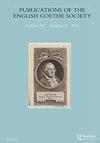从政治理想到政治田园:哈勒和维兰德对Fénelons Télémaque的接受
IF 0.1
3区 文学
0 LITERATURE, GERMAN, DUTCH, SCANDINAVIAN
引用次数: 0
摘要
摘要在Fénelon的《Télémaque的复仇者》(1699)出版两代人之后,它提出的统治教育模式开始崩溃。虽然阿尔布雷希特·冯·哈勒在他的小说《Usong》(1771年)中试图复兴这种模式,但维兰德在他的《Goldner Spiegel》(1772年)中证明,Télémaque只是一种田园诗般的记忆:维兰德的复杂故事并没有更新旧的理想,而是标志着贵族教育所有理想主义目的的终结。本文章由计算机程序翻译,如有差异,请以英文原文为准。
Vom politischen Ideal zum politischen Idyll: Die Rezeption von Fénelons Télémaque durch Haller und Wieland
Abstract Two generations after the publication of Fénelon’s Aventures de Télémaque (1699), the educational model of rulership it proposed began to crumble. While Albrecht von Haller tries to revive this model in his novel Usong (1771), Wieland demonstrates in his Goldner Spiegel (1772) that Télémaque figures only as an idyllic memory: instead of renewing old ideals, Wieland’s complex story marks the end of all idealistic purposes of aristocratic education.
求助全文
通过发布文献求助,成功后即可免费获取论文全文。
去求助
来源期刊

Publications of the English Goethe Society
LITERATURE, GERMAN, DUTCH, SCANDINAVIAN-
CiteScore
0.10
自引率
0.00%
发文量
15
 求助内容:
求助内容: 应助结果提醒方式:
应助结果提醒方式:


